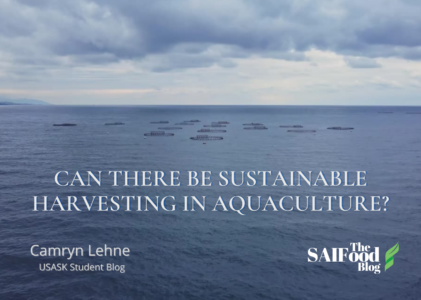By Camryn Lehne
University of Saskatchewan Student
What is overfishing?
Overfishing refers to a level of fishing that is not sustainable and hampers the rebuilding of a fish species population (Government of Canada, 2009). The goal of sustainable aquaculture is to maintain or improve profitability while minimizing waste and environmental damage. Without sustainable aquaculture practices, we will face a food crisis, an economic collapse, and have major environmental impacts.
Our oceans are under pressure due to rising temperatures, commercial overfishing, and attempts to meet the needs of growing populations. New and dangerous fishing methods have made it possible for commercial fishing operations to become larger and bring in more fish. One of these dangerous fishing methods referred to as ‘bottom trawling’ involves a large net that is dragged along the ocean floor, destroying sensitive habitats and coral reef structures that takes decades to develop (Downs, 2019). These fishing methods are used to bring in as much fish as possible, no matter what is destroyed or killed in the process. ‘Rod-and-reel’ is the proper way to catch fish sustainably; however, this is a slow process with only one fish caught at a time (National Geographic, 2012). This way of fishing does prevent overfishing and helps at-risk species repopulate.
Illegal fishing is also a large contributor to the declining fish stocks and is affecting the coral reef structures which are home to thousands of species of fish (Government of Canada, 2009). Illegal fishing refers to fishing activities that go against applicable laws and regulations in certain regions or states (NOAA, 2021). Fishing without a license, keeping too many fish or a certain species, fishing in restricted or protected areas, and keeping undersized fish are all examples of illegal fishing practices. Norway, Japan, and Iceland commercial whaling have killed nearly 100,000 whales every year (Szecsei, 2021). Norway and Iceland make their own claims to their whaling under the International Whaling Commission, whereas Japan in 2019 left this organization. In addition, 40% of all fish caught by illegal fisheries are unintentional catches. Around 300,000 small whales and dolphins, 250,000 turtles, and 300,000 seabirds are captured and killed by accident (Szecsei, 2021).
What are the main effects of overfishing?
Overfishing will cause fish stocks to collapse and may take decades to recover, which will also then threaten jobs, communities, and protein options. If the supply of fish decreases, the supply and demand for other proteins must rise, forcing pressure on our other food systems (MSC, 2021). While in Western Canada, we might not take into account the full impact overfishing could have, but we need to consider that billions of people rely on seafood for their daily source of nutrition (Government of Canada, 2009). China has the largest seafood consumption footprint at 65 million tonnes a year, followed by the European Union at 13 million tonnes, and Japan at 7.4 million tonnes (Cattaneo, 2018). These three regions account for roughly 55% of seafood consumption and it is not surprising that they are also on a “shame list” for the constant overfishing of tuna (Seafood Source, 2013).
The consequences of overfishing and coral degradation go hand in hand. If the corals start to die off, all the marine species from the reefs will vanish or die since their only food source will have disappeared (Anonymous, 2020). This will cause a change in the size of fish available which will create an imbalance in the aquatic food chain. The loss of the coral reefs and the fish that live within them would mean a loss of jobs for millions of fishermen around the world, depriving them of their main source of income (Dennis, 2016). Many reef complexes today have 40-50 percent fewer corals than they did 30 years ago (Allen et al., 2018). Dying corals is another factor in the significant decline in fish stocks.
Australia is one of the countries that is struggling due to overfishing. Australia is known for having the Great Barrier Reef, just off the Queensland Coast, which is the largest coral structure in the world and is home to more than 1,500 species of fish. Due to the diminishing corals and overfishing in the area, the reef is nearly a memory of what it once was; this, in turn, affects their tourism which is a crucial part of the Australian economy, as visits to a bleached coral reef diminish (Brown, 2019). Overfishing affects the coral reefs because overfishing can deplete key reef species. Fish and coral reefs have a mutually beneficial relationship, both helping each other out (NOAA, 2021).
Canada was affected by overfishing in the 1990s when there was the collapse of the Atlantic Canadian cod fishery. Too many fish were caught and there were not enough adult fish to breed and populate the waters. Over 35,000 men and women lost their jobs (MSC, 2021). After almost three decades, the Atlantic cod stocks are still not back (Smellie, 2021). The impact that overfishing has had on the Maritime communities has been significant and it is more than what I can cover in this one blog.
Is there a solution?

We are overfishing, but we can make some changes to stop the issue. If you want to help, the best way to start is to look for the Blue Fish MSC label when buying seafood products. This label means the seafood you’re buying can be traced back to their certified sustainable fishery (MSC, 2021). Companies including Safe Catch, Wild Planet, American Tuna, and Marine Stewardship Council are all known for being sustainably caught and without causing harm to the ocean environment (Richeson, 2021).
There are many new laws and regulations that are helping to stop overfishing as well. There are nearly 22 international treaties that aim to protect fish stocks globally. This includes the 1982 United Nations Convention on the Law of the Sea (UNCLOS), the 1993 FAO Compliance Agreement, and the 1995 UN Fish Stocks Agreement. These laws manage some of the most extensive efforts to stop overfishing– including total catch limits, satellite monitoring of linked ships, and documentation of fish caught (Sovacool, 2007). The Magnuson-Stevens Fishery Conservation and Management Act (MSA) is the main law against fisheries in U.S. waters. This law tries to prevent overfishing, helps with rebuilding overfished stocks, and ensures a safe and sustainable supply of seafood (NOAA, n.d.).
Government of Canada, F. and O. C. (2009, February 3). Government of Canada. International Fisheries. Retrieved October 15, 2021, from https://www.dfo-mpo.gc.ca/international/isu-global-eng.htm.
Downs, A. (2019, November 3). 6 illegal fishing methods and destructive practices. Takemefishing.org. Retrieved December 15, 2021, from https://www.takemefishing.org/blog/march-2019/illegal-fishing-methods-destructive-practices/
National Geographic Society, N. G. S. (2012, October 9). Sustainable fishing. National Geographic Society. Retrieved December 24, 2021, from https://www.nationalgeographic.org/encyclopedia/sustainable-fishing/
NOAA Fisheries. (2021). Understanding illegal, unreported, and unregulated fishing. NOAA. Retrieved December 15, 2021, from https://www.fisheries.noaa.gov/insight/understanding-illegal-unreported-and-unregulated-fishing
Szecsei, S. (2021, December 16). 32 sad overfishing statistics (2021 update). Petpedia. Retrieved December 24, 2021, from https://petpedia.co/overfishing-statistics/
MSC. (2021). Overfishing explained. Marine Stewardship Council. Retrieved October 15, 2021, from https://www.msc.org/en-au/what-we-are-doing/oceans-at-risk/overfishing.
Cattaneo, B. (2018, September 27). How much fish do we consume? First Global Seafood Consumption Footprint published. EU Science Hub – European Commission. Retrieved December 15, 2021, from https://ec.europa.eu/jrc/en/news/how-much-fish-do-we-consume-first-global-seafood-consumption-footprint-published
Seafood Source. (2013, December 2). Pew: Japan, China, US, others overfishing Pacific Tuna. SeafoodSource Official Media. Retrieved December 15, 2021, from https://www.seafoodsource.com/news/environment-sustainability/pew-japan-china-us-more-overfishing-pacific-tuna
Anonymous author. (2020, October 16). What will happen if all coral reefs die? Retrieved March 26, 2021, from https://telanganatoday.com/what-will-happen-if-all-coral-reefs-die
Dennis, B. (2016, November 9). Why the death of coral reefs could be devastating for millions of humans. Retrieved March 26, 2021, from https://www.washingtonpost.com/news/energy-environment/wp/2016/11/09/why-the-death-of-coral-reefs-could-be-devastating-for-millions-of-humans/
Allen, M.R., et al. (2019). 2018: Framing and Context. In: Global Warming of 1.5°C. An IPCC Special Report on the impacts of global warming of 1.5°C above pre-industrial levels and related global greenhouse gas emission pathways, in the context of strengthening the global response to the threat of climate change, sustainable development, and efforts to eradicate poverty [Masson-Delmotte, V., P. et al (eds.)]. In Press. Retrieved March 26, 2021, from https://www.ipcc.ch/sr15/chapter/chapter-1/
Brown, T. (2019, April 17). Great barrier reef. Retrieved March 26, 2021, from https://www.nationalgeographic.org/article/great-barrier-reef/
Smellie, S. (2021, April 19). After almost 3 decades, cod are still not back off N.L. scientists worry it may never happen | CBC news. CBCnews. Retrieved October 15, 2021, from https://www.cbc.ca/news/canada/newfoundland-labrador/cod-return-1.5992916
Richeson, L. P. (2021, May 14). A Guide to Sustainable Seafood Shopping 2021. The Manual. Retrieved November 21, 2021, from https://www.themanual.com/food-and-drink/sustainable-seafood-shopping-guide/
Sovacool, B.K, and K.E. Siman-Sovacool. (2007, October 4)/ Creating Legal Teeth for Toothfish: Using the Market to Protect Fish Stocks in Antarctica, Journal of Environmental Law, Volume 20, Issue 1, 2008, Pages 15–33, https://doi-org.cyber.usask.ca/10.1093/jel/eqm024
NOAA (n.d.). Laws & Policies. NOAA Fisheries Laws and Policies. Retrieved November 21, 2021, from https://www.fisheries.noaa.gov/topic/laws-policies#magnuson-stevens-act
Camryn Lehne

My name is Camryn Lehne, and I am from North Central Saskatchewan. I currently attend the University of Saskatchewan, working toward a degree in Agriculture. I am interested in agriculture because of the critical role it plays in food production and sustainability, as well as economic welfare. Agriculture will always be needed and important especially in Saskatchewan and I want to help out in any way I can. Talking with farmers and learning their ways and practices of farming.
Ever since I was a kid I have been interested in animals and ways I can help them. The topic of overfishing and protecting the ocean has always been of interest to me. I’ve grown up seeing the ocean and have seen the brutal effects of pollution, overfishing, and climate change on the ocean. Being in Saskatchewan, I can’t do much to save the ocean. But I know that every little bit helps.


